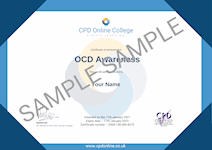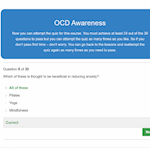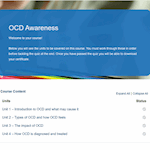OCD Awareness CPD Course
Online CPD course covering Obsessive Compulsive Disorder
CPD Online College
Summary
- Exam(s) / assessment(s) is included in price
Add to basket or enquire
Overview
In our OCD Awareness course you will learn that OCD is not an easy condition to diagnose as the ways in which is affects individuals can vary greatly. This course covers how OCD can impact someone's life and those around them, especially if left untreated.
CPD
Course media
Description
Our OCD Awareness course is suitable for anyone wanting a greater understanding about what OCD is and how to deal with someone who has it.
You will then learn that Obsessive Compulsive Disorder (OCD), like many other mental illnesses is often misunderstood and that the flippancy with which the general population refer to OCD means that it is difficult for individuals to be taken seriously when they have real and serious symptoms.
You will consider the different possible causes of OCD and the categories of which they are put in. You will learn that there is little chance of OCD being caused by one single factor and therefore it is is important that a number of potential factors are examined to determine what might bring about the onset of the condition.
The course will also cover in detail the different 'types' or 'categories' of OCD that someone may fall into and that it will depend on the types of behaviours that come about because of intrusive thoughts.
You will consider that physical health issues often develop as a result of OCD and that these can affect someone's life, especially if they too go untreated or unacknowledged.
On completion of this course you will learn that CAMHS teams are made up of different professionals who work together to ensure that children and adolescents are supported during times of mental ill health.
In order to complete the course, you must achieve 80% or more in the final multiple choice quiz.
You will earn 3 CPD points on completion of the course, this course will take around 3 hours to complete and the certificate will last for two years.
- Fully CPD registered
- Completed online with instant downloadable certificate
- Fully printed certificate posted next day
- Complete the online multiple choice assessment as many times as you need to pass
Units covered.
- Unit 1 - Introduction to OCD and what may cause it - The first unit introduces the general concept of OCD to dispel some of the myths about what OCD actually is as it remains a mental illness that is very misunderstood. The unit goes on to look at some of the possible causes of OCD, reflecting that it is likely that it is caused by a number of factors rather than just one definitive cause as this has yet to be identified by healthcare professionals. The unit ends with an exploration of what is meant by the cycle of OCD and how this can impact someone’s life to the point where they are unable to function on a normal daily basis.
- Unit 2 - Types of OCD and how OCD feels - This unit examines the kinds of OCD that someone may be diagnosed with and looks at some of the kinds of intrusive thoughts and behaviours that someone may experience which make up the signs and symptoms of OCD. The unit then explores what obsessive compulsive disorder can feel like to an individual with two case studies to follow; the first one a fictitious account and the second one a real account of what it is like to have OCD and what impact it can have on someone’s daily life.
- Unit 3 - The impact of OCD - This unit focuses on what the overall impact of OCD will be for the individual and for others. It considers the impact that it will have on the individual’s ability to be involved in positive relationships and on their ability to hold down employment and carry out normal daily tasks. The impact on other people is also considered and how it can affect a child and their parents. The unit ends with two case studies, each of which involves a real individual with a reflection on how OCD has affected their life.
- Unit 4 - How OCD is diagnosed and treated - The final unit explores how OCD is diagnosed before looking at some of the ways in which it is treated. It considers some treatments and resources before ending with a reflection on how the individual can self-manage their symptoms and what other people can do to help them manage them as well.
Who is this course for?
Anyone wanting more knowledge around what OCD is and the treatments available.
Requirements
There are no requirements needed to complete this course.
Career path
Anyone wanting more knowledge around what OCD is and the treatments available.
Reviews
Currently there are no reviews for this course. Be the first to leave a review.
Legal information
This course is advertised on reed.co.uk by the Course Provider, whose terms and conditions apply. Purchases are made directly from the Course Provider, and as such, content and materials are supplied by the Course Provider directly. Reed is acting as agent and not reseller in relation to this course. Reed's only responsibility is to facilitate your payment for the course. It is your responsibility to review and agree to the Course Provider's terms and conditions and satisfy yourself as to the suitability of the course you intend to purchase. Reed will not have any responsibility for the content of the course and/or associated materials.







